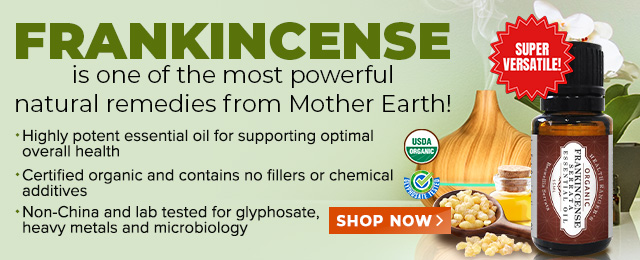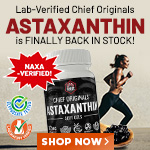
Sugar and Spice: Learn How Cinnamon Promotes Healthy Blood Sugar Levels
Friday, July 31, 2009 by: Elizabeth Walling
Tags: cinnamon, health news, Natural News
- Aerosolized bioweapons? Strange “diploid biomasses” falling out of the sky in Florida captured under the microscope
- German researchers find link between mRNA vaccines and GENETIC CHANGES that precede CANCER and AUTOIMMUNE DISORDERS
- Exclusive: Microscopic analysis suggests unknown biological contaminants falling from the sky
- DEATH by 12 VACCINES SIMULTANEOUSLY: Doctor playing catch-up on jabs injects 1-year-old baby with massive combination of dirty vax cocktails
- FBI imposed gag order on agents to silence Hunter Biden laptop truth before 2020 election, new chat logs reveal
- Newly released JFK files reveal Pentagon's role in creating Lyme disease and covid in the same lab
- European Court of Justice: Healthcare professionals who promoted or administered COVID-19 vaccines are CRIMINALLY LIABLE for any harm caused
- Nature's liver guardian: Milk thistle's timeless antidote to modern toxin overload
- “Project Aldrin”: Senate probes Meta's alleged censorship dealings with China
- “Bankrupt Tesla” movement EXPOSED: Left-wing extremists, Biden-linked operatives target Elon Musk in coordinated attack
- How the Vaccine Industry escaped accountability for nearly FOUR DECADES, endangering children’s lives for false hopes of protection
- The dark legacy of the U.S. government’s UNETHICAL medical and military research
- NASA, State Dept. admit to renaming DEI programs to dodge Trump's ban in undercover sting
- When antibiotics are unavailable, natural ANTIMICROBIAL compounds become essential first line defenses against infection
- “The Message of the Sphinx”: Did a lost civilization build the Giza monuments?
- Sleep shortfalls and silent brain decline: How poor sleep patterns may herald Alzheimer's risk
- Astaxanthin: Nature’s ultimate antioxidant powerhouse
- Dr. Mary Talley Bowden drops bombshells about children being permanently damaged by mRNA jabs during Tucker Carlson interview
- Newly released JFK files reveal Pentagon's role in creating Lyme disease and covid in the same lab
- Oncologist warns of ‘terrifyingly aggressive’ cancers in children, linked to immune suppression from COVID vaccines
- Kiss Your Genetic Privacy Good-Bye! 23andMe Gets Green Light to Sell Your Intimate Genetic Details to Anyone They Want
- European Court of Justice: Healthcare professionals who promoted or administered COVID-19 vaccines are CRIMINALLY LIABLE for any harm caused
- Analysis: The coming economic collapse, a mass uprising and Trump's three secret weapons to halt the growing revolt
- Woman contracts WORLD'S DEADLIEST VIRUS after unknowingly being given the WRONG VACCINE
- Sugar-free deception: Artificial sweeteners hijack hunger signals, fuel obesity epidemic, study warns
- NIH study, buried for decades, reveals that Flu Shots INCREASE elderly deaths, not prevent them
- Britain’s descent into police state censorship: Parents raided for questioning their daughter’s school system online
- AI weather model outperforms traditional forecasts, boosts accuracy by 20%
- Aerosolized bioweapons? Strange “diploid biomasses” falling out of the sky in Florida captured under the microscope
- DARPA: The shadowy innovator behind the world’s most advanced military technologies
- The Health Ranger releases “Vaccine Zombie” song and music video, using AI-animated zombies for the music video
- Utah governor allows ban on LGBT pride flags in public buildings and schools, will take effect without his signature
- COVID-19 scandal linked to CANCER SURGE: Billionaire researcher sounds alarm
- Musk targets “strangely wealthy” lawmakers in DOGE probe, names Pelosi, McConnell, Schumer
- Dr. Suzanne Humphries makes bombshell appearance on Joe Rogan podcast, exposing vaccine industry deception back to POLIOMYELITIS
- Ancient kitchen secrets REVEALED: How garlic, ginger and green onions fight cancer and heart disease
- Newly released JFK files reveal Pentagon's role in creating Lyme disease and covid in the same lab
- California's social media censorship law struck down: A victory for free speech or a threat to online safety?
- EPA advisor admits the agency is funneling billions to climate groups ahead of Trump’s return to White House
- Dr. Mike Yeadon releases 15-minute testimony - WATCH - about genocidal intent of COVID “vaccines”
- The Health Ranger releases “Vaccine Zombie” song and music video, using AI-animated zombies for the music video
- Florida takes a stand: DeSantis proposes permanent ban on mRNA vaccine mandates
- Rep. Nancy Mace introduces bill to ban biological males from female facilities on federal property
- Mike Adams releases country western hit single: Goin’ Back in Time is Comin’ Home
- Sugarcane extract superior to cholesterol-lowering drugs?
- Survival 101: Effective EMF blocking techniques
- “Why we influenced the 2020 elections”: Facebook files reveal the coordinated effort to bury the Hunter Biden laptop story
- Unpacking the Lies That We’ve Been Fed – new song and music video released by Mike Adams, the Health Ranger
- House Intelligence Committee calls for the ARREST and PROSECUTION of Dr. Anthony Fauci
- The pandemic as a tool for INDOCTRINATION: Understanding “The Indoctrinated Brain” by Dr. Michael Nehls
- Mike Adams releases music poetry sensation: A Child of God
- OpenAI whistleblower who dissented against how the company trained ChatGPT found dead
- Attorney and TikTok influencer explains how he was offered hundreds of dollars to make false claims about Trump, Republicans
- CONSERVATIVES SOUND THE ALARM: Big Pharma and the Left trying to force $32 billion money grab from America’s seniors into year-end spending deal
- Red Cross issues warning to stop blood plasma donations from vaccinated people
- Scientists confirm: GENIUS brain function can be spontaneously unleashed in humans without any apparent cause
- EPA advisor admits the agency is funneling billions to climate groups ahead of Trump’s return to White House
- HYSSOP: What research reveals about the health benefits of this ancient holy herb
- Two containers with completed ballots fall out of truck in Florida
- Fully vaccinated about to see “tsunami” of illness and death, warns virologist
- Global leaders unite to clamp down on “misinformation” with UN-backed Cascais Declaration
- BREAKING: 2025 NDAA authorizes mandatory military draft of WOMEN across America… as Pentagon pursues global NUCLEAR war with both Russia and China at the same time
- Michael Yon warns of a ZIONIST TAKEOVER in Trump’s second administration
- Ozempic and Wegovy weight loss drugs are injectable LIZARD VENOM PEPTIDES that may unleash a devastating wave of organ failure… side effects align with symptoms of SNAKE BITES
- BOMBSHELL: DNA testing kits are a SCAM to develop ethnic-specific bioweapons
- Newly released JFK files reveal Pentagon's role in creating Lyme disease and covid in the same lab
- Israeli soldiers accused of even more torture and abuse in the West Bank
- These 13 countries just signed an agreement to engineer a global FAMINE by destroying food supply
- NASA admits that climate change occurs because of changes in Earth’s solar orbit, and NOT because of SUVs and fossil fuels
- The Health Ranger releases “Vaccine Zombie” song and music video, using AI-animated zombies for the music video
- RFK Jr. clears key hurdle: Sen. Susan Collins backs controversial HHS nominee, signaling a new era for health policy
- Sermon 30: How Jesus reveals Caesar’s FAKE CURRENCY and FALSE AUTHORITY
One of the first studies to call attention to the blood sugar benefits of cinnamon was published in 2003 in Diabetes Care. The study included 60 participants with type II diabetes who were given a daily dosage of one, three or six grams of cinnamon in capsule form (which is about one-quarter to one teaspoon in typical powder form). The participants were monitored for 40 days, and all recorded a significant decrease in fasting blood glucose levels - some as much as 29 percent. There was not a notable difference in results between the three dosage levels.
Another study published in the European Journal of Clinical Investigation in 2006 examined the effects of cinnamon extract on blood sugar. There were 79 participants in this study, all with type II diabetes that was being treated with oral medication and diet therapy (as opposed to insulin medication and therapy). Participants were randomly given a placebo or a cinnamon extract capsule filled with 112 mg of water-soluble extract (which is equal to about one gram of cinnamon). The dosage was given three times daily. Those who were given the cinnamon extract showed more than a 10 percent improvement in fasting glucose levels, versus a 3 percent improvement in the control group.
A small Swedish study gave 14 participants a daily cup of rice pudding, plain or with six grams of cinnamon added. Researchers recorded blood glucose levels and the rate of gastric emptying after participants ate the pudding. The cinnamon appeared to slow down stomach emptying, and blood glucose levels were notably lower in those who ate the pudding with cinnamon.
Researchers aren't completely sure whether cinnamon influences insulin or whether it affects the rate at which sugars are absorbed, but the results of these and other studies are intriguing, and will hopefully lead to more research about just how cinnamon causes these positive blood glucose results.
For most people, adding a small daily dose of cinnamon to their diet is almost effortless. In fact, what better way is there to start the morning than with a bowl of whole-grain oatmeal, sweetened with stevia and flavored with cinnamon? It's an ideal breakfast food for someone aiming to control blood sugar. Or add a little cinnamon to your daily cup of tea, coffee or hot chocolate. You can also add an extra dash of cinnamon to desserts like apple pie or bread pudding to help tame the blood sugar highs that come with indulging in sweets. Of course, cinnamon isn't an excuse to over-indulge in sugar, but it can help balance our blood sugar when we do occasionally satisfy our sweet tooth. Cinnamon can also be used in capsule form for those who would rather not add the spice to their food.
For More Information:
http://www.foodprocessing.com/articles/2007/...
http://altmedicine.about.com/od/qalibrary/f/...
http://www.medicalnewstoday.com/articles/462...
About the author
Elizabeth Walling is a freelance writer specializing in health and family nutrition. She is a strong believer in natural living as a way to improve health and prevent modern disease. She enjoys thinking outside of the box and challenging common myths about health and wellness. You can visit her blog to learn more:www.livingthenourishedlife.com/2009/10/welco...
Cinnamon at FETCH.news
Get independent news alerts on natural cures, food lab tests, cannabis medicine, science, robotics, drones, privacy and more.
Take Action: Support Natural News by linking to this article from your website
Permalink to this article:
Embed article link: (copy HTML code below):
Reprinting this article:
Non-commercial use OK, cite NaturalNews.com with clickable link.
Follow Natural News on Facebook, Twitter, Google Plus, and Pinterest
Science News & Studies
Medicine News and Information
Food News & Studies
Health News & Studies
Herbs News & Information
Pollution News & Studies
Cancer News & Studies
Climate News & Studies
Survival News & Information
Gear News & Information
News covering technology, stocks, hackers, and more



"Big Tech and mainstream media are constantly trying to silence the independent voices that dare to bring you the truth about toxic food ingredients, dangerous medications and the failed, fraudulent science of the profit-driven medical establishment.
Email is one of the best ways to make sure you stay informed, without the censorship of the tech giants (Google, Apple, Facebook, Twitter, YouTube, etc.). Stay informed and you'll even likely learn information that may help save your own life."
–The Health Ranger, Mike Adams












































